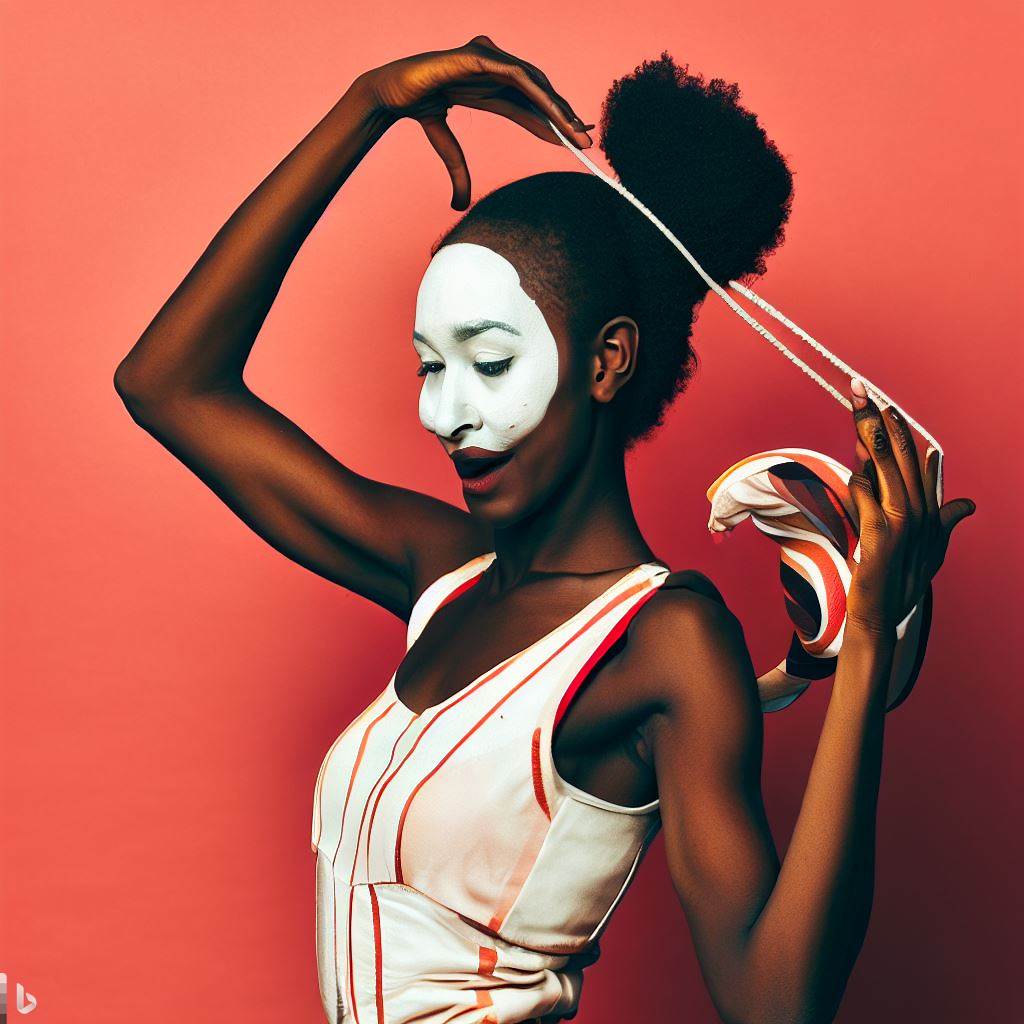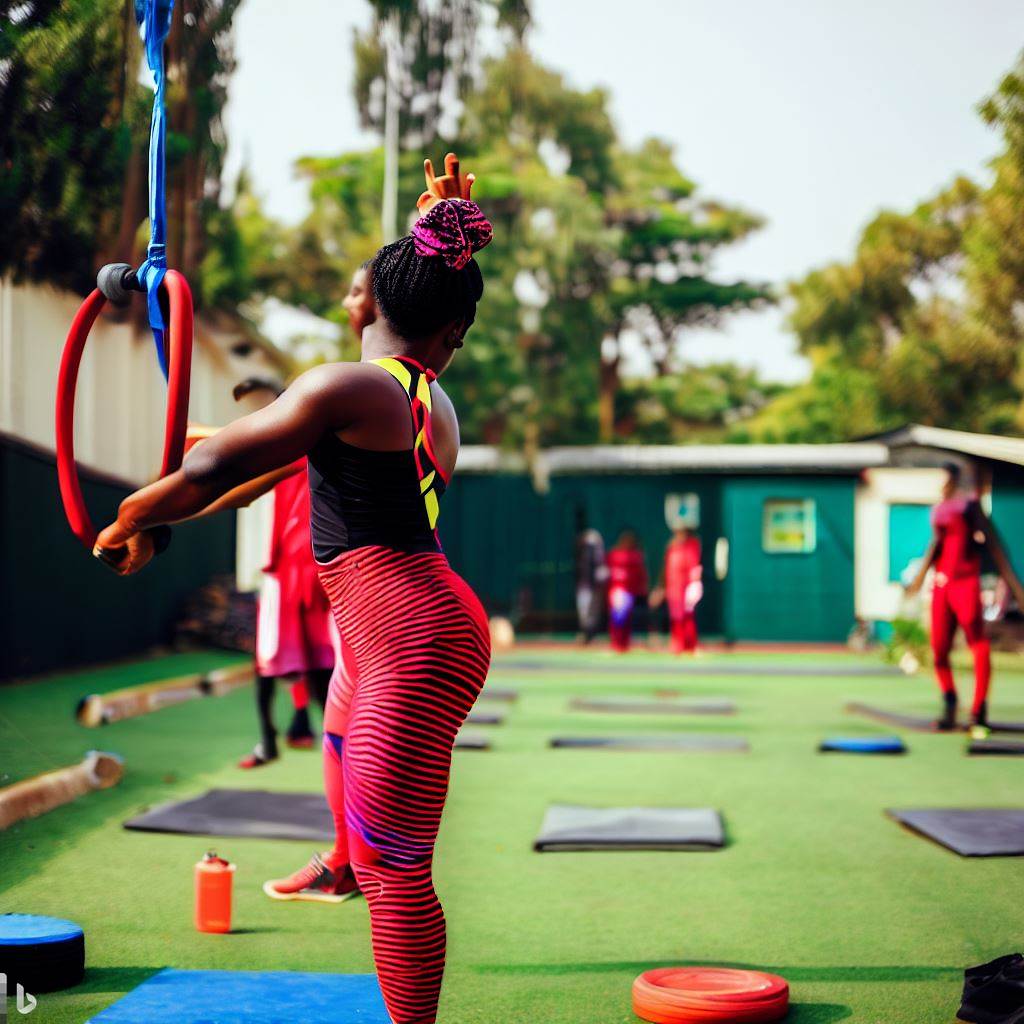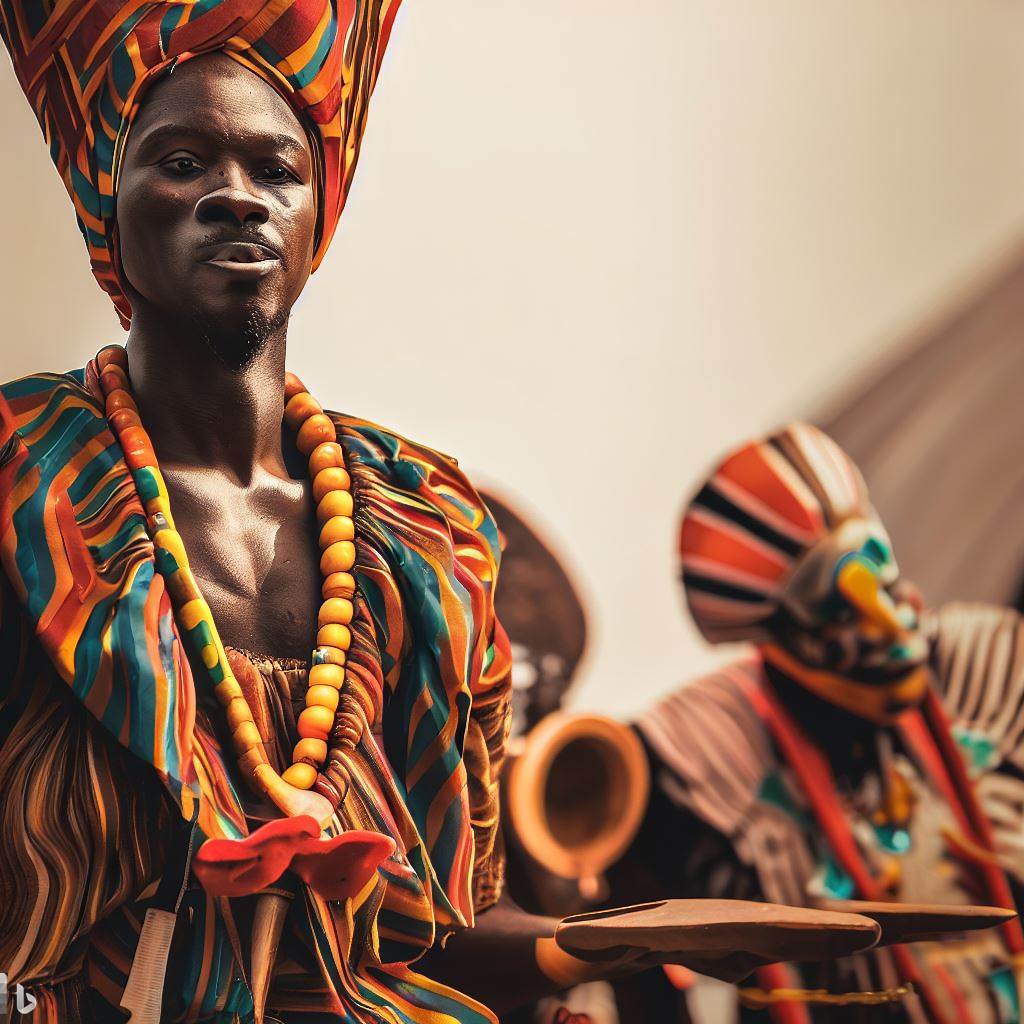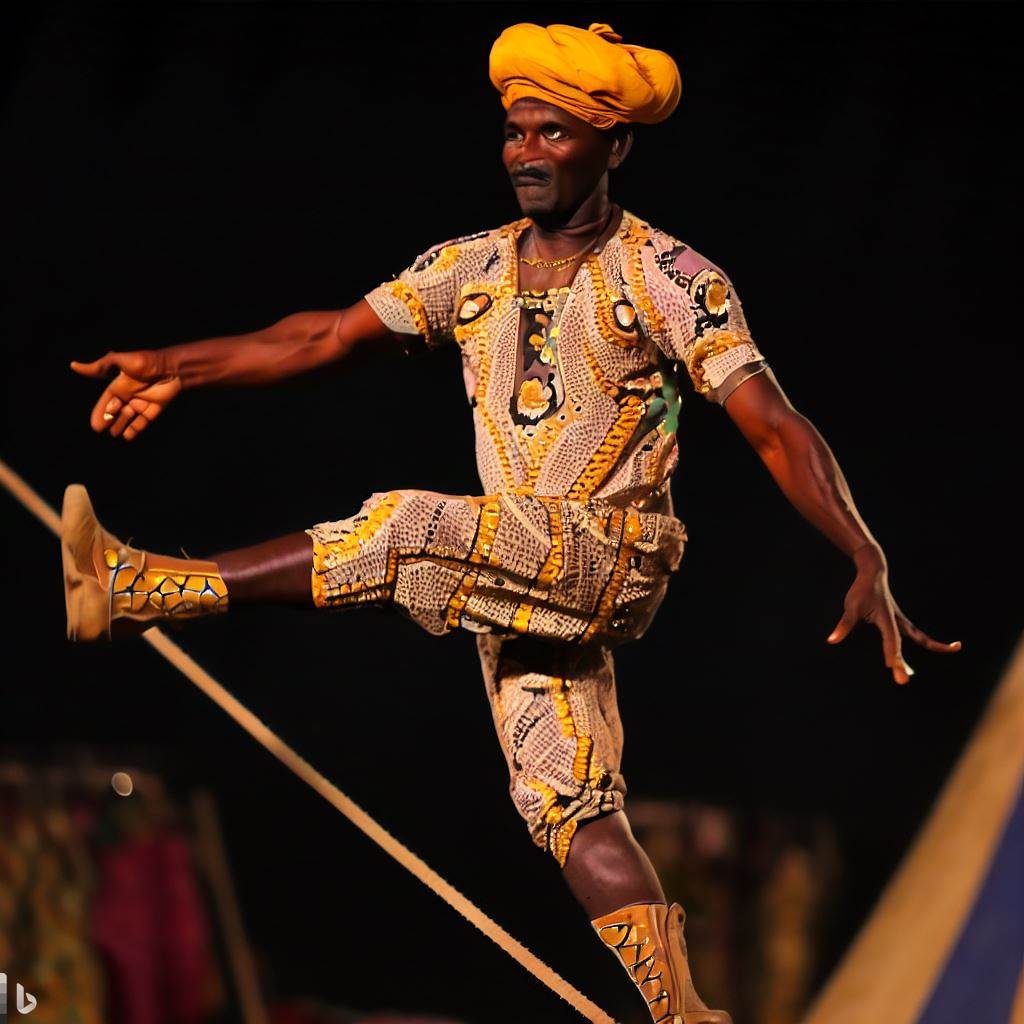Introduction
Circus performances have a rich history that dates back centuries, captivating audiences worldwide.
In Nigeria, circus performances have gained prominence as a form of entertainment and art.
This blog post aims to define the role of a circus performer in Nigeria today.
Circus performances have enthralled audiences for centuries, originating from ancient civilizations across the globe.
The art form has evolved over time, encompassing a variety of acts such as acrobatics, aerial stunts, juggling, and more.
These spectacles have held a special place in people’s hearts, offering a unique form of entertainment that combines skill, finesse, and creativity.
In Nigeria, circus performances hold significant prominence.
With a vibrant and diverse culture, Nigerians have embraced the circus as a platform for both entertainment and artistic expression.
The country has witnessed an upsurge in the popularity of circus arts, with various groups and individuals showcasing their talents at festivals, events, and even on television.
The role of a circus performer in Nigeria today is multifaceted and encompasses several aspects.
Firstly, they entertain audiences with mesmerizing acts, displaying exceptional physical prowess and skill.
These performers captivate spectators through their daring stunts, graceful movements, and impeccable timing.
Evolution of Circus Performances in Nigeria
A. Early introduction of circus performances in Nigeria
- Circus performances have a long history in Nigeria, dating back to the early 20th century.
- The first circus shows were introduced by European settlers who aimed to entertain the local population.
- These early circus acts featured traditional European acts such as acrobats, jugglers, and clowns.
- Nigerians quickly embraced the circus performances, finding joy and excitement in the daring and skillful acts.
- Over time, Nigerian performers began to emerge, adding their unique cultural elements to the circus acts.
- Traditional Nigerian circus acts started incorporating dance, music, storytelling, and indigenous props.
B. Factors contributing to the growth of circus performances in Nigeria
- The popularity of circus performances in Nigeria can be attributed to various factors.
- Increased urbanization provided a larger audience base and venues for circus shows.
- Government support and investment in the arts sector facilitated the growth of the circus industry.
- Economic realities encouraged the development of circus as a viable profession for many Nigerians.
- Circus training schools and workshops were established, nurturing new talents and improving skills.
- Social media and technological advancements have also played a significant role in promoting circus performances.
C. Comparison of traditional Nigerian circus acts to contemporary performances
While traditional Nigerian circus acts paved the way for modern performances, there have been notable changes.
- Contemporary circus acts in Nigeria have evolved to include a fusion of traditional and modern elements.
- Traditional acrobatics and fire-eating are still prevalent, but they are now accompanied by innovative and daring acts.
- Circus performers incorporate elements of storytelling, dance, and theater to create captivating narratives.
- The use of advanced equipment and technology has elevated the technical aspects of circus performances.
- Contemporary Nigerian circus performers also explore social and political themes, reflecting the country’s current issues.
- The growing recognition and respect for circus as an art form have led to collaborations with renowned international performers.
Circus performances in Nigeria have come a long way since their early introduction by European settlers.
The growth of the circus industry can be attributed to factors such as urbanisation, government support, and technological advancements.
Traditional Nigerian circus acts blended indigenous elements, but contemporary performances fuse tradition and modernity, emphasising innovation and storytelling.
They showcase technical excellence.
Circus in Nigeria continues to thrive and gain recognition as a vibrant and dynamic art form.
Skills and Talents Required
A. Overview of the various skills possessed by circus performers
- Acrobatics: Performers must excel in various acrobatic movements such as flips, twists, and tumbles.
- Balance: Circus performers need exceptional balance to execute daring acts on tightropes, unicycles, and other props.
- Juggling: The ability to juggle multiple objects simultaneously is a fundamental skill for circus performers.
- Aerial Skills: Circus performers often master aerial skills such as trapeze, silk, and aerial hoop performances.
- Contortion: Flexibility and body control are essential for contortion acts that amaze audiences with their bendability.
B. Physical abilities necessary for circus acts
- Strength: Circus performers must possess great physical strength to perform gravity-defying stunts.
- Endurance: The ability to endure physically demanding acts for extended periods is crucial for circus performers.
- Agility: Quick reflexes and nimble movements are necessary to navigate through complex circus routines flawlessly.
- Coordination: Precise coordination of body movements is vital for synchronized performances and complex acrobatics.
- Stamina: Circus performers need exceptional stamina to sustain high-energy performances and repetitive routines.
C. Specific talents relevant to Nigerian circus performers
- Cultural Storytelling: Nigerian circus performers can incorporate traditional stories and folklore into their acts.
- Afrobeat Dance: Nigerian performers can showcase their talent in Afrobeat dance, adding a cultural flair to the circus.
- Drumming: The rhythmic skills of Nigerian circus performers can be highlighted through drumming performances.
- Mask Work: Traditional masks and costumes can be used to add a unique element to circus acts in Nigeria.
- Fire Dancing: Nigerian performers can showcase their talent in fire dancing, blending cultural elements with circus skills.
As circus performers in Nigeria, individuals require a diverse range of skills and talents to succeed in this unique industry.
The fusion of acrobatics, balance, juggling, and aerial skills forms the core foundation of a circus performer’s abilities.
With countless hours of practice, circus performers defy gravity through extraordinary feats, captivating audiences with their daredevil moves.
Physical attributes play a pivotal role in circus acts. Strength is crucial for performers to execute gravity-defying stunts and lifts.
Endurance allows them to sustain demanding performances, showcasing their skills for extended periods.
Agility and coordination enable performers to navigate intricate routines and maintain seamless synchronization.
For Nigerian circus performers, specific talents that reflect their culture can further enhance their acts.
Cultural storytelling can be interwoven into performances, sharing traditional stories and folklore with the audience.
Afrobeat dance adds authenticity and cultural flair, showcasing the vibrant rhythms of Nigeria and capturing the audience’s attention.
The rhythmic skills of Nigerian circus performers can shine through drumming performances, accentuating the African beat and adding an element of spectacle to the acts.
Read: Top Interpreter and Translator Training Institutions in Nigeria
Role of Circus Performers in Society
A. Entertainment and engagement with audiences
Circus performers play a crucial role in providing entertainment and engaging with audiences through their captivating acts.
They have the ability to create a sense of wonder, awe, and excitement among spectators.
The circus performances often include acrobatics, juggling, tightrope walking, and daredevil stunts.
By showcasing their extraordinary skills and talents, circus performers bring joy and laughter to people’s lives.
They have the power to transport the audience into a world of fantasy and magic, away from their daily routines.
Circus performers interact with the audience, making them an integral part of the entire experience.
Through their exceptional abilities, they manage to captivate and hold the attention of their spectators throughout the show.
B. Cultural preservation and promotion
In a diverse country like Nigeria, circus performers contribute to the preservation and promotion of cultural traditions.
They showcase traditional dances, costumes, and music, representing various ethnic groups in the country.
Circus acts often incorporate elements of Nigerian folklore, mythology, and storytelling, thus helping preserve cultural heritage.
By performing these acts, circus performers keep traditional art forms alive and relevant in contemporary society.
They also contribute to community development by organizing cultural festivals and events that celebrate Nigeria’s rich traditions.
Circus performances provide a platform for artists to collaborate and exchange cultural ideas.
Additionally, circus performers can act as cultural ambassadors, promoting Nigerian culture to international audiences.
C. Inspiring and mentoring future performers
Circus performers play a significant role in inspiring and mentoring aspiring artists in Nigeria.
They serve as role models, showcasing the possibilities and opportunities within the performing arts industry.
By sharing their journey, skills, and experiences, they motivate young performers to pursue their dreams.
Circus performers lead workshops and training sessions, imparting their knowledge and expertise to the next generation.
They provide guidance, advice, and support to young artists, helping them develop their skills and reach their full potential.
Through mentorship programs, circus performers ensure the continuity and growth of the performing arts sector in Nigeria.
Circus performers in Nigeria have a multifaceted role in society.
They entertain and engage audiences, bringing joy and excitement to people’s lives.
Circus acts also contribute to the preservation and promotion of cultural heritage, representing various ethnic traditions.
Moreover, they inspire and mentor future performers, ensuring the growth and development of the industry.
As Nigeria continues to embrace the performing arts, circus performers remain vital in shaping the country’s cultural landscape.
Read: Career Path: From Novice to Pro Sound Editor in Nigeria

Challenges Faced by Circus Performers in Nigeria
A. Limited infrastructure and facilities
- Nigeria lacks proper circus training centers and performance venues.
- The scarcity of specialized equipment and props hinders the development of circus skills.
- Many areas in Nigeria have inadequate or non-existent circus performance spaces.
- The absence of safety measures and regulations poses significant risks to performers.
- Circus artists struggle to find suitable locations for training and rehearsals.
B. Economic constraints and lack of support
- The circus industry in Nigeria faces financial challenges due to limited funding.
- Circus performers struggle to secure sponsorships or grants for their performances.
- The lack of government support and recognition affects the growth and sustainability of circus arts.
- Insufficient funds prevent performers from investing in quality training and professional development.
- Circus artists often have to rely on low-paying gigs to sustain their livelihood.
C. Societal perception and stereotypes towards circus arts
- Circus arts are often perceived as inferior or childish compared to other art forms.
- Stereotypes depict circus performers as uneducated or lacking talent.
- The Nigerian society, influenced by cultural biases, often look down upon circus artists.
- Many people believe that circus is not a viable career choice in Nigeria.
- The negative perception discourages aspiring performers from pursuing circus as a profession.
Circus performers in Nigeria face numerous challenges that hinder their growth and success.
The limited infrastructure and facilities make it difficult for them to train and perform effectively.
Economic constraints and lack of support further add to their struggles, as they face financial difficulties and the absence of government recognition.
Moreover, societal perception and stereotypes towards circus arts create additional obstacles for performers, discouraging them from pursuing their passion.
Despite these challenges, dedicated circus artists in Nigeria continue to defy the odds, showcasing their incredible talents and resilience.
Read: Work Opportunities for Translators and Interpreters in Nigeria
Opportunities for Nigerian Circus Performers
A. Collaboration with international circus troupes
- Nigerian circus performers can gain valuable experience and exposure by collaborating with international circus troupes.
- Working alongside seasoned professionals will help Nigerian performers improve their skills and expand their network.
- International collaborations can lead to international tours, allowing Nigerian performers to showcase their talent on a global stage.
- Cross-cultural exchanges can enrich the Nigerian circus scene, bringing new techniques and artistic influences.
- Collaborations with international circus troupes can attract foreign investments and sponsorship opportunities for Nigerian performers.
B. Utilizing social media platforms for promotion and exposure
- Social media platforms provide Nigerian circus performers a cost-effective way to promote their acts and reach a wider audience.
- Performers can create engaging content, share behind-the-scenes footage, and connect directly with fans and potential clients.
- Platforms like Instagram and YouTube allow performers to showcase their skills and gain followers from around the world.
- Through social media, Nigerian circus performers can attract bookings for corporate events, festivals, and private shows.
- Using targeted online advertising, performers can reach specific demographics and expand their fanbase.
C. Development of local circus festivals and events
- Nigeria can establish its own circus festivals and events to provide a platform for local performers to showcase their talent.
- Organizing regular circus festivals can create a sense of community among Nigerian performers and foster collaborations.
- Local festivals can attract tourists and generate revenue for the local economy, benefiting circus performers and other stakeholders.
- Nigerian circus festivals can become cultural highlights, promoting the country’s arts and entertainment industry.
- Through these events, Nigerian performers can gain recognition in their own country and build a dedicated fanbase.
Nigerian circus performers have various opportunities to thrive in the industry today.
Collaboration with international circus troupes provides valuable experience, exposure, and the potential for international tours.
Utilising social media platforms allows performers to promote their acts, connect with fans, and attract bookings.
The development of local circus festivals and events creates a platform for Nigerian performers to showcase their talent and gain recognition.
By taking advantage of these opportunities, Nigerian circus performers can further their careers and contribute to the growth of the circus industry in Nigeria.
Read: Decoding the Music Publishing Landscape in Nigeria
Impact of Circus Performers on Nigerian Culture
A. Contribution to the tourism industry
Circus performers play a vital role in boosting Nigeria’s tourism sector through their captivating shows.
Their skills, tricks, and daring acts attract both domestic and international tourists.
The performances act as a unique selling point for Nigeria, enticing tourists to explore the country’s rich cultural heritage.
Circus shows create employment opportunities for local communities, such as ticket sellers, ushers, and vendors.
Tourists often spend money on accommodation, transportation, and local goods, benefiting the Nigerian economy.
B. Representation of Nigerian diversity and creativity
Circus performers showcase the immense diversity of talent, skills, and creativity present in Nigeria.
They come from various ethnic backgrounds, showcasing different cultures, traditions, and performing arts.
Through their acts, they introduce spectators to the beauty and uniqueness of Nigerian customs and traditions.
Circus performances serve as a platform for artists to express themselves and showcase their individual art forms.
Audiences witness the fusion of modern techniques with traditional Nigerian performing arts, highlighting the country’s cultural evolution.
C. Enhancement of national pride and identity
Circus performers instill a sense of national pride and identity among Nigerians by showcasing their talents internationally.
They represent Nigeria on global stages, gaining recognition and accolades, which boosts the country’s reputation.
The achievements of circus performers inspire young Nigerians to pursue their dreams and strive for excellence.
Their success reinforces the belief that Nigerians can excel in any field, fostering a sense of pride and unity.
Circus performances celebrate Nigerian heritage, reminding citizens of the richness and beauty of their cultural traditions.
Circus performers have a profound impact on Nigerian culture. They contribute to the tourism industry by attracting tourists, creating employment opportunities, and stimulating the local economy.
Through their performances, they represent Nigerian diversity and creativity, showcasing various traditions and art forms.
Moreover, circus performers enhance national pride and identity, inspiring young Nigerians and celebrating the country’s heritage.
Their presence and contributions shape Nigeria’s cultural landscape, making them invaluable assets to the nation.
Conclusion
A. Recap of the main points discussed
Throughout this blog section, we have explored the role of circus performers in Nigeria today.
We have learned that they are talented individuals dedicated to entertaining and inspiring audiences.
B. Emphasize the importance of recognizing and supporting the role of circus performers in Nigeria
It is crucial to acknowledge the value and significance of circus performers in Nigeria.
They bring joy, cultural representation, and economic opportunities to the country.
They deserve recognition and support from both the government and the public.
C. Closing thoughts and call to action
Let us appreciate and celebrate the incredible skills and dedication of circus performers in Nigeria.
We should attend and promote their shows, invest in their training and development, and advocate for their rights and fair treatment.
By doing so, we can ensure the growth and sustainability of this vibrant art form in Nigeria.
Together, let us shine a spotlight on the captivating world of circus performers and contribute to their success.




